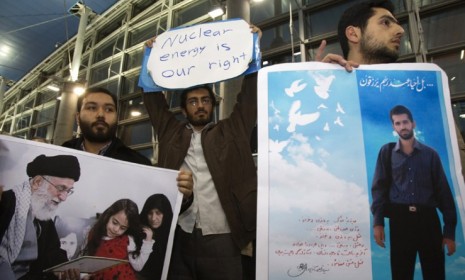Iran's nuclear threat: Can inspections defuse the tensions?
Many Western diplomats hope their worst fears won't be confirmed as international nuclear experts arrive in Iran for a fact-finding mission

A free daily email with the biggest news stories of the day – and the best features from TheWeek.com
You are now subscribed
Your newsletter sign-up was successful
A team of inspectors from the International Atomic Energy Agency (IAEA) began a potentially crucial three-day visit to Iran on Sunday. Tehran's top diplomat said he was confident that talks between inspectors and Iranian officials would soothe foreign leaders, who fear that the Islamic Republic is trying to build nuclear weapons. But tensions remain high. The U.S. and Europe recently announced tough new sanctions designed to deprive the Iranian government of oil income it needs to survive, and Iran reacted with a threat to block all oil shipments out of the Persian Gulf (See The Week's briefing on Iran's threat to close the Strait of Hormuz). Could the inspections prevent the confrontation from escalating?
This is a start: "The standoff between the U.S. and Iran has raised tensions in the Persian Gulf region to the boiling point," says Javid Husain in Pakistan's The Nation. The important thing now is to start cooling off. All concerned must "avoid hostilities and adopt the path of negotiations," because everybody loses if a shooting war erupts in the Strait of Hormuz. Inspections could be an important first step, but only if the U.S. will back down if its suspicions aren't confirmed by the IAEA.
"U.S. double standards and Iran"
The Week
Escape your echo chamber. Get the facts behind the news, plus analysis from multiple perspectives.

Sign up for The Week's Free Newsletters
From our morning news briefing to a weekly Good News Newsletter, get the best of The Week delivered directly to your inbox.
From our morning news briefing to a weekly Good News Newsletter, get the best of The Week delivered directly to your inbox.
These inspections are essentially useless: "If the intention is to browbeat Iran, the inspectors aren't going to get anywhere," says M.K. Badhrakumar at Indian Punchline. Even if the inspectors find damning evidence, Iran's leaders have made it clear they "won't blink" — which means they will continue defying the West by producing more nuclear fuel no matter what.
"Silver lining in the Iran situation"
It all depends what the inspectors say: Nobody knows whether Iran's leaders are "acting in good faith," says James M. Lindsay at the Council on Foreign Relations, or "using the visits as part of a delaying strategy to buy more time for their nuclear program." We simply need more information. That's why the world will be closely following the IAEA inspectors' mission, "and listening to what they say after they depart [Iran]."
"What will IAEA inspectors find in Iran?"
A free daily email with the biggest news stories of the day – and the best features from TheWeek.com
-
 Why is the Trump administration talking about ‘Western civilization’?
Why is the Trump administration talking about ‘Western civilization’?Talking Points Rubio says Europe, US bonded by religion and ancestry
-
 Quentin Deranque: a student’s death energizes the French far right
Quentin Deranque: a student’s death energizes the French far rightIN THE SPOTLIGHT Reactions to the violent killing of an ultraconservative activist offer a glimpse at the culture wars roiling France ahead of next year’s elections
-
 Secured vs. unsecured loans: how do they differ and which is better?
Secured vs. unsecured loans: how do they differ and which is better?the explainer They are distinguished by the level of risk and the inclusion of collateral